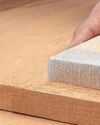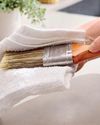WINTER WARMTH
The Home Handyman
|May/June 2025
Insulation and energy- saving tips: Stay cosy while reducing energy costs.
-

Winter often arrives quickly, and if your home isn't prepared, you might find yourself layering up on the sofa. By choosing effective insulation, sealing draughts, and making a few smart changes, you can stay warm without racking up high heating bills. Below, we explore practical ways to insulate your home, manage heat loss through windows and doors, and maintain proper ventilation so you can stay snug all season long.
Why insulation matters
When temperatures drop, warm air naturally tries to escape to cooler areas. Without enough insulation, heat slips away through roofs, walls, floors, and windows. By slowing that transfer, you allow your heating system to run more efficiently. Think of insulation as a protective shield for your interior, keeping warmth in and cold air out. The more thorough your approach – covering the attic, walls, and small gaps – the more comfortable your home will feel.
Starting with the ceiling space
Because warm air rises, the loft or ceiling space is often a key source of heat loss. Rolls of fibreglass or mineral wool placed between rafters create a barrier that stops heat from drifting upward. Wear gloves and a mask, as fibreglass can irritate skin and lungs. If you have recessed lights in the ceiling below, maintain safe clearances so heat doesn't build up around them.
Insulating walls and floors
Your choice of insulation depends on your home's design and your budget. Fibreglass batts are common but can be itchy to handle. Mineral wool is moisture-resistant, which is helpful in damper climates. Foam boards are excellent beneath floors or against walls but can cost more initially. In older houses with timber floors, even a thick rug helps prevent chilly air from creeping up. Sometimes, a simple floor covering can mean the difference between constantly wearing slippers and walking comfortably in socks.
Sealing windows and doors
यह कहानी The Home Handyman के May/June 2025 संस्करण से ली गई है।
हजारों चुनिंदा प्रीमियम कहानियों और 10,000 से अधिक पत्रिकाओं और समाचार पत्रों तक पहुंचने के लिए मैगज़्टर गोल्ड की सदस्यता लें।
क्या आप पहले से ही ग्राहक हैं? साइन इन करें
The Home Handyman से और कहानियाँ

The Home Handyman
KEEP YOUR HOUSE CRITTER FREE
With winter fast approaching, outdoor critters seeking to regulate their temperature are trying their best to get inside. Ants, spiders, moths, mosquitoes, fruit flies, stink bugs, termites, silverfish, and ladybugs, to name a few, can easily make their way into homes, and once they've settled in, it's often hard to get them out.
6 mins
Jul/Aug'25

The Home Handyman
SECRET HIDEOUTS
We all have things we would prefer to keep out of plain sight - family heirlooms, wedding rings, expensive jewellery, medicines or even weapons. Sometimes we just want to keep household items hidden in order to declutter a space. Whether you want to hide items for safety or financial reasons, or simply want to keep your bedroom tidy, there are a few clever storage ideas that could help you out.
2 mins
Jul/Aug'25

The Home Handyman
ABRASIVES DEMYSTIFIED
Abrasive materials are indispensable in countless industries, from woodworking and metal fabrication to automotive repair and electronics manufacturing.
3 mins
Jul/Aug'25

The Home Handyman
THINNERS VS. TURPENTINE
If you've ever finished a painting or staining job and been left wondering how best to clean your brushes, you're not alone. One of the most common DIY questions is: Should I use thinners or turpentine to clean my brushes? The answer depends on the type of paint or coating you've used. Using the wrong solvent can damage your brushes, or worse, make the cleaning job even harder.
2 mins
Jul/Aug'25

The Home Handyman
KEEP THE COLD OUT
Did you know that homes in South Africa are either insulated to a poor standard, compared to European nations, or have no form of insulation at all. In 2011 our National Building Regulations made it compulsory to fit thermal insulation in new buildings and additions to building structures.
5 mins
Jul/Aug'25

The Home Handyman
ANGLE GRINDERS — MASTERING THIS VERSATILE TOOL
When it comes to versatile tools in a DIYer's arsenal, few can match the power and practicality of the angle grinder.
2 mins
Jul/Aug'25

The Home Handyman
KITCHEN CARE – MAINTENANCE TIPS FOR KEY AREAS
The kitchen is the heart of the home where meals are made, memories are shared, and chaos sometimes reigns. But like any hardworking space, your kitchen needs regular maintenance to keep it functional, safe, and looking great.
2 mins
Jul/Aug'25

The Home Handyman
Separating Fact from Fiction
Maintaining your home can be a daunting task, especially with the plethora of DIY tips and tricks floating around the internet.
2 mins
Jul/Aug'25

The Home Handyman
SEALANTS SIMPLIFIED: WHAT TO USE AND WHERE
Whether you’re tackling a weekend DIY fix, remodelling your home, or involved in large-scale construction, sealants are a silent hero that play a vital role in creating watertight, airtight, and secure finishes.
3 mins
Jul/Aug'25

The Home Handyman
COMMON FRIDGE/FREEZER FAULTS
Your fridge freezer is one of the hardest-working appliances in your home, so when it stops performing as it should, it can cause major inconvenience. The good news? Not every fault means an expensive call-out or a trip to the shops for a new one. In many cases, you can fix the issue yourself with a little know-how and a few basic tools.
3 mins
Jul/Aug'25
Listen
Translate
Change font size

